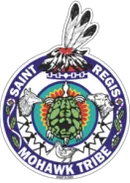State-Wide Impacts Felt Locally
AKWESASNE -- Emergency Medical Service organizations within New York State have faced challenges to their operations for many years. Fewer people entering the profession, fewer volunteers, existing providers retiring or moving to less stressful fields of work, low reimbursement rates for transports, relatively low pay, and impacts from COVID-19 mandates have all accelerated the challenges for paid and volunteer EMS organizations alike. These challenges have impacted the ability of EMS agencies to sustain coverage in the communities they serve and even to remain solvent as businesses.
These impacts are being felt across the North Country, and will soon be felt locally as the Saint Regis Mohawk Tribe’s Tribal EMS contractor - Seaway Valley Ambulance - will no longer have the staffing to continue its daily Advanced Life Support (ALS) coverage for Akwesasne.
“In 2016, the Tribe contracted with Seaway Valley Ambulance to increase community safety and response times with the addition of a fully staffed ALS Ambulance,” shared Tsiorasa Barreiro, SRMT Executive Director. “Seaway Valley and Akwesasne Mohawk Ambulance have worked cooperatively to provide backup support for the other during multiple calls, traumas, and life-threatening emergencies. Due to factors beyond our control Seaway Valley Ambulance has informed the SRMT that they will not have the staffing required to continue our contract in 2022. This is a disappointment to SRMT and to the management of Seaway Valley as any future medical assistance would come from Massena NY rather than our local ambulance bay on the territory”
As a result of the COVID-19 Pandemic, the health industry has struggled to keep pace with the increasing need for emergency medical service. The physical and mental demand of working in the health field has stretched the medical field to its limits. Long hours due to increasing calls, regular recertification requirements, limited hospital bed capacity, lower pay, and risking your personal safety to a deadly virus have taken their toll.
Many ambulance services are being faced with similar challenges and difficult decisions to make in order to maintain service. With limited bed capacity at nearby hospitals, it has resulted in diversions to medical facilities further away, which is resulting in longer transport times. In response, ambulance units from neighboring communities are doing their best to respond and help shoulder calls for emergency transports from throughout the region.
“This is not a unique issue to the Akwesasne community, this is a regional crisis,” stated Michael Cook, SRMT Health Director, during live radio talk show on CKON 97.3 on November 10th. “Hospital diversions due to limited beds, staffing shortages, and other circumstances are increasing wait times as ambulances are taken out of their immediate service area. We’re seeing people needing to wait 45 minutes for another community’s ambulance service to respond.”
“We have been in contact with Akwesasne Mohawk Ambulance about this coming change. AMA will do their best to provide service to the entire community, as they always have,” added Cook.
There are also fewer people entering the health field as a career and choosing to become medical technicians, which is making a bad situation worse. Nationwide, there is a shortage of emergency medical technicians (EMT) and paramedics. According to a survey conducted by the American Ambulance Association, the turnover among paramedics and EMTs ranges from 20 to 30 percent annually, resulting in an unsustainable 100 percent turnover every four years.
The Tribe is working on developing a long-term plan for the community, as well as to stress the vital role that EMTs serve. Utilizing the Franklin County Mutual Aid Network and creating a “fly-car” are some options being pursued however, it does not address the growing need for more people to become EMTs, Paramedics, or even ambulance drivers.
“We have to grow our own EMTs and Paramedics from within the Akwesasne community due to border travel requirements and other unique challenges,” said Derek Comins, Director of the Tribe’s Office of Emergency Management and Safety. “Knowing that you made a difference in someone’s life has been among the best rewards during my time as an EMT. I highly encourage those who may be interested, but apprehensive, on becoming an EMT to contact Akwesasne Mohawk Ambulance about opportunities to become an ambulance driver.”
Through the Tribe’s Employment, Education, and Training Program; the $850 cost for books and to enroll in an EMT course is covered. Stipends are also available through ACESS for interested community members.
If you require emergency transport, please contact the 911 or tribal police dispatch at (518) 358-9200 in Akwesasne’s southern portion, while the northern portion can call Akwesasne Emergency Dispatch at (613) 575-2000.
For information on how to become an Emergency Medical Technician, Paramedic or ambulance driver, please contact Akwesasne Mohawk Ambulance at (613) 575-2250 extension 3121.
#####
The Saint Regis Mohawk Tribal Council is the duly elected and federally recognized government of the Saint Regis Mohawk Tribe.

